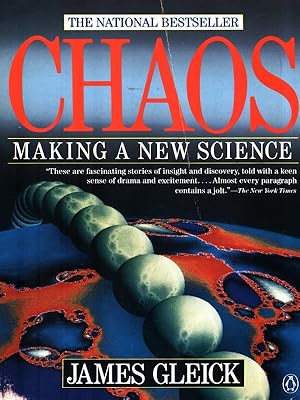

While not without precedent, this is an unusual situation for a subject that is concerned first and foremost with developments in mathematics, some of which are, in fact, of fairly mature vintage. footnote 3 Terms from chaos theory, such as ‘butterfly effect’ and ‘strange attractor’, have entered the common vocabulary, though not always used very precisely.


Science writer James Gleick’s book on the subject has become a bestseller, footnote 2 there have been numerous articles in the general press and programmes on television, and New Scientist ran an extensive series of weekly articles on the relevance of chaos theory to a range of disciplines. T here is currently a great deal of excitement about the notion of chaos. Wilson Literary Science Writing Award, and Time Travel: A History. He lives in Key West and New York.It is difficult for professional scientists, much less the general public, to distinguish excessive hype from solid scientific achievement. He worked for ten years as an editor and reporter for The New York Times, founded an early Internet portal, the Pipeline, and has written several books of popular science, including The Information: A History, a Theory, a Flood, which won the PEN/E. James Gleick was born in New York City in 1954. " Chaos is a feast." - The Washington Post Book World Reading it gave me that sensation that someone had just found the light switch." -Douglas Adams, author of The Hitchhiker's Guide to the Galaxy a startling look at newly discovered universal laws." - Chicago Tribune a fascinating illustration of how the pattern of science changes." - The New York Times Book Review almost every paragraph contains a jolt." - The New York Times In Chaos, Gleick makes the story of chaos theory not only fascinating but also accessible to beginners, and opens our eyes to a surprising new view of the universe. From Edward Lorenz's discovery of the Butterfly Effect, to Mitchell Feigenbaum's calculation of a universal constant, to Benoit Mandelbrot's concept of fractals, which created a new geometry of nature, Gleick's engaging narrative focuses on the key figures whose genius converged to chart an innovative direction for science. The million-copy bestseller by National Book Award nominee and Pulitzer Prize finalist James Gleick- the author of Time Travel: A History-that reveals the science behind chaos theoryĪ work of popular science in the tradition of Stephen Hawking and Carl Sagan, this 20th-anniversary edition of James Gleick's groundbreaking bestseller Chaos introduces a whole new readership to chaos theory, one of the most significant waves of scientific knowledge in our time.


 0 kommentar(er)
0 kommentar(er)
